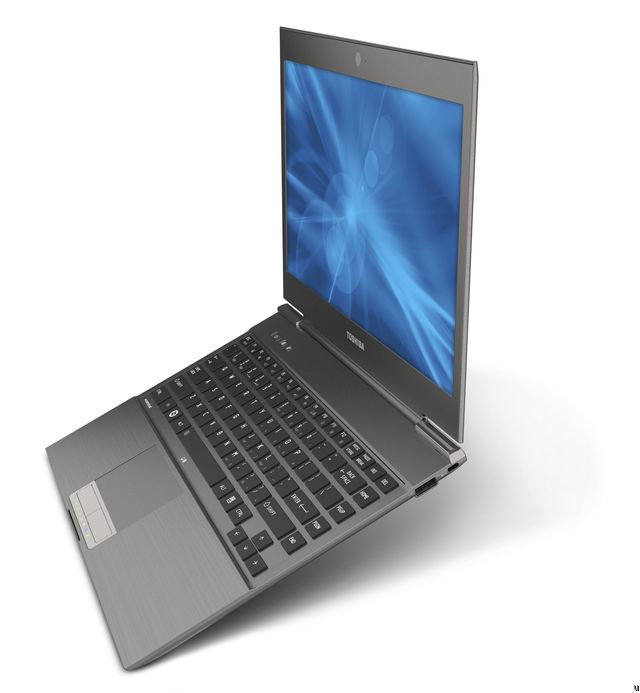Toshiba Portege Z830 [Ultrabook]

Despite its size, the Portege Z830 supports up to quad-core processors (Core i3-i7), 128GB of SSD storage and 6GB of DDR3 RAM. Given that the second generation of Intel Core processors have functions like hardware mpeg4 video encoding, a small computer like this one could outperform last year’s full-size laptops at video compression. I know… my Core i7 (gen1) Macbook Pro 15 is getting clobbered in video compression by new ultralights.
Toshiba aims at providing 8 hours of battery life, which would be in line with what the Ultrabook reference design was built for. However, we will have to conduct an independent review to confirm this.
To entice users to save even more battery life, Toshiba uses its Hi-Speed Start technology which accelerates the boot and wake-up time. For example, when the user “shuts down”, Windows logs off, saves the state of the system at that moment before turning itself off. When the computer is turned on later, loading that state is much quicker than performing a standard boot sequence. The Toshiba Portege Z830 will be available in November 2011, and although there is no official pricing yet, Toshiba has told us that this was going to be a sub-$1000 system.
You May Also Like
Popular Right Now
- First Shutdown of Niagara Falls in 12,000 Years: A Rare Sight to Behold
- Former Google Engineer claims that humans will achieve immortality soon
- Romotow: The Foldable Camping Trailer Inspired By A USB Flash Drive
- LYRA: Swiss Startup Unveils AR Smart Glasses for Office Work, City Life, And Traveling
- Man Caught in China Smuggling $46K Worth of Intel CPUs Wrapped Around His Waist
- iPhone 15 Pro Max may bring thinner bezels than Xiaomi and Samsung’s latest flagships
- OpenAI's new GPT-4 with a "human-level performance" scored up to 93% on SAT exams
- iPhone SE 4 could be Apple's secret weapon to 'steal' budget customers from Samsung
- Lenovo Launches New Workstations, With Aston Martin DNA
- Ubergizmo’s Best of Mobile World Congress 2023
- TCL NXTPAPER 11 Tablet With Paper-like Screen Experience
- Nothing Phone 2 Coming To The U.S. In Late 2023
- Ubergizmo’s Best Of K-Startup @ CES
- Intel Core i9-13900T Shows Extraordinary Efficiency In Early Benchmarks
- Ubergizmo’s Top 3 MIK Products @ CES 2023
- Three LG gram Laptops For 2023. The Lightest Got Even Lighter